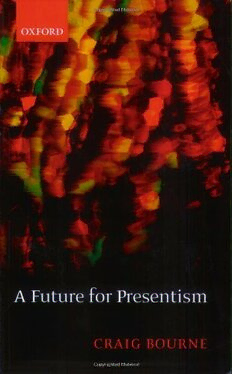
A Future for Presentism PDF
257 Pages·2009·0.967 MB·English
Most books are stored in the elastic cloud where traffic is expensive. For this reason, we have a limit on daily download.
Preview A Future for Presentism
Description:
Presentism, the view that only the present exists, was a much neglected position in the philosophy of time for a number of years. Recently, however, it has been enjoying a renaissance among philosophers. A Future for Presentism is meant as a timely contribution to this fast growing and exciting debate. After discussing rival positions in the philosophy of time, in Part I Craig Bourne shows how presentism is the only viable alternative to the tenseless theory of time. He then develops a distinctive version of presentism that avoids the mistakes of the past, and which sets up the framework for solving problems traditionally associated with the position, such as what makes past-tensed statements true, how to give the proper semantics for statements about the future, how to deal with transtemporal relations between the past and the present, how we can meaningfully talk about the future, how to deal with transtemporal relations between the past and the present, how we can meaningfully talk about past individuals, and how causal relations can be formulated. Part I concludes with a discussion of the direction of time and causation, the decision-theoretic problem known as "Newcomb's problem," and the possibility of time travel and causal loops. In Part II Bourne focuses on the problems for presentism raised by relativity theory. He begins with by giving a self-contained exposition of the concepts of special relativity that are important for understanding the later discussion of its philosophical implications. The last two chapters explore the philosophical implications of certain cosmological models that arise from general relativity, namely the expanding models, which seem to represent our universe, and G???del's infamous model, which allows us to take a journey into our future and arrive in our past. The necessary physics is explained with the aid of diagrams, throughout.
See more
The list of books you might like
Most books are stored in the elastic cloud where traffic is expensive. For this reason, we have a limit on daily download.
